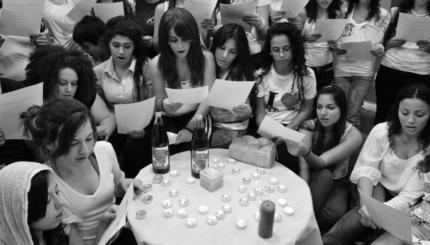Lekhah Dodi
(‘Come my friend’) is the hymn sung on Friday night to welcome Shabbat. The prayer begins, “Come my friend, to meet the bride; let us welcome the presence of the Sabbath.” Samantha Kuperberg explores the disconnect she feels towards the prayer and the assumption held within the words of the hymn.
I turned toward the door and bowed and felt nothing.
I focused on the Shabbos bride. I focused on how beautiful she is, and how joyous I should be to greet her. I focused on her flowing hair, her warm smile, her pure white dress. It was then it occurred to me, and I wasn’t sure why it hadn’t occurred to me sooner.
She was not for me.
 This Shabbos bride was not for me. She was for her husband: “ateret baʿalah” (crown of her husband). I was supposed to rejoice thinking of that lucky man greeting her: “kimsos chatan al kalah” (as the groom rejoices in his bride). In that moment, Lekhah Dodi was no longer a celebration of the Shabbos day. It became a heavy imposition of the male gaze. I found myself struggling. I imagined myself a mystic in Safed. My beautiful bride running down a hill to meet me. I still felt nothing. Then imagined she wasn’t for me. She was a friend. A friend who was walking down the aisle. I imagined I was the bride.
This Shabbos bride was not for me. She was for her husband: “ateret baʿalah” (crown of her husband). I was supposed to rejoice thinking of that lucky man greeting her: “kimsos chatan al kalah” (as the groom rejoices in his bride). In that moment, Lekhah Dodi was no longer a celebration of the Shabbos day. It became a heavy imposition of the male gaze. I found myself struggling. I imagined myself a mystic in Safed. My beautiful bride running down a hill to meet me. I still felt nothing. Then imagined she wasn’t for me. She was a friend. A friend who was walking down the aisle. I imagined I was the bride.
And then I felt anger.
In my moment of supposed connection and utter joy, I was reminded to conform myself to a universe where male desire reigns large. I was twisting my brain in order to respond and react to the male gaze. I was not to see the Shabbos bride through my own eyes, but through a husband’s eyes. I had to imagine my happiness and pleasure in that shadow. She was not for me.
Lekhah Dodi has always been one of my favorite prayers. In the temple where I grew up, our rabbi would grab his guitar and lead us children in a line throughout the sanctuary. We would sing and dance and be uplifted. For me, that was true joy, and I was giddy to welcome in Shabbat. I miss that natural, effortless feeling.
We need new ways of viewing this Shabbos person.
We need to acknowledge that the overarching masculinity of Judaism may contribute to disconnect.
And as we do that, I will continue to struggle with her.
Like this post?
- Join the conversation through MyJewishLearning’s weekly blogs newsletter.
- Get breaking LGBTQ Jewish news, resources and inspiration from Keshet in your inbox!

